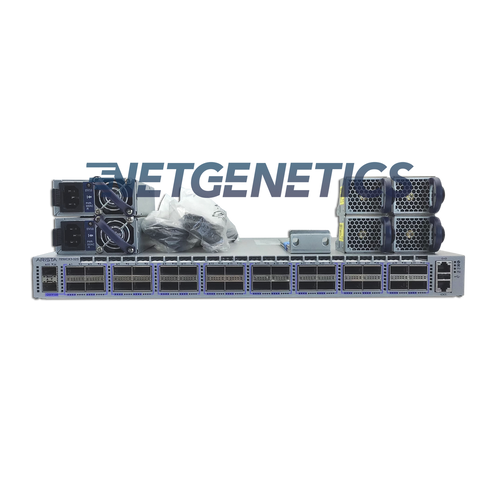Overview
The Arista DCS-7060DX4-32-F is a high-performance, fixed-configuration data center switch that provides 32 x 100GbE QSFP28 ports with front-to-back airflow, making it ideal for modern data center environments. Its high-density port configuration, low-latency performance, and advanced Layer 2/3 features make it a versatile solution for leaf-spine architectures, cloud data centers, and high-performance enterprise networks. The switch supports a wide range of flexible configurations with breakout options for 10/25/50GbE, ensuring that it can adapt to evolving network requirements.
The Arista DCS-7060DX4-32-F is part of Arista’s 7060X4 series of high-performance data center switches. This switch is designed for environments that demand high-density 100GbE connectivity, low-latency, and high-performance, with support for flexible configurations for 25/50/100GbE speeds. It is well-suited for leaf and spine network architectures in data centers and cloud environments. Below are the key specifications and features of the DCS-7060DX4-32-F switch.
Specifications
- Model: Arista DCS-7060DX4-32-F
- Series: Arista 7060X4 Series
- Type: Fixed-configuration, high-performance data center switch
- Form Factor: 1 RU (Rack Unit)
- Airflow: Front-to-back airflow (denoted by the -F in the model number).
- 2. Interfaces and Ports
- 32 x 100GbE QSFP28 ports:
- Each QSFP28 port can support 100GbE, 40GbE, or can be split into multiple lanes (4x25GbE, 4x10GbE) using breakout cables for flexible port configurations.
- Each port can also be configured to support 50GbE, depending on the network setup.
- Management Ports:
- 1 x RJ45 management port for out-of-band management.
- 1 x USB 2.0 port for local management and file transfers.
- 1 x RJ45 console port.
- 3. Performance
- Switching Capacity: 6.4 Tbps (terabits per second).
- Forwarding Rate: 3.2 Bpps (billion packets per second).
- Latency: Ultra-low latency, typically sub-microsecond, designed for high-performance, low-latency environments such as financial services and cloud data centers.
- Packet Buffer: 32 MB shared buffer for handling traffic surges and bursts.
- MAC Address Table: Supports up to 288,000 MAC addresses.
- 4. Layer 2 and Layer 3 Features
- Layer 2 Features:
- IEEE 802.1Q VLAN support with up to 4,000 VLANs.
- Spanning Tree Protocol (STP): Supports STP, RSTP, and MSTP for preventing network loops.
- Link Aggregation: Supports IEEE 802.3ad LACP for bundling multiple physical links into a single logical link.
- Jumbo Frames: Supports jumbo frames with a maximum frame size of up to 9,216 bytes.
- Layer 3 Features:
- Full IPv4 and IPv6 routing capabilities, including OSPF, BGP, RIP, IS-IS, and static routing.
- Equal-Cost Multi-Path (ECMP): Supports up to 128-way ECMP for load balancing and redundancy in routed networks.
- Multicast Routing: PIM-SM, PIM-SSM, IGMP for efficient delivery of multicast traffic.
- VRF-lite: Supports Virtual Routing and Forwarding (VRF) for network segmentation.
- VXLAN: Supports VXLAN for network virtualization, providing Layer 2 overlay networks over a Layer 3 infrastructure.
- 5. Quality of Service (QoS)
- Traffic Classification: Supports traffic prioritization based on Layer 2, Layer 3, and Layer 4 headers.
- Traffic Shaping and Policing: Supports bandwidth management through traffic shaping and policing mechanisms.
- Congestion Management: Advanced congestion control mechanisms like Data Center TCP (DCTCP) and Explicit Congestion Notification (ECN) for low-latency data center environments.
- Scheduling: Includes Weighted Round Robin (WRR) and Strict Priority (SP) queuing to prioritize critical traffic.
- 6. Security Features
- Access Control Lists (ACLs): Provides standard and extended ACLs for filtering Layer 2, Layer 3, and Layer 4 traffic.
- Port Security: Supports limiting the number of MAC addresses allowed on a port, preventing unauthorized devices from connecting to the network.
- Dynamic ARP Inspection (DAI): Prevents ARP spoofing attacks by verifying the authenticity of ARP packets.
- DHCP Snooping: Ensures that only trusted DHCP servers are allowed to distribute IP addresses in the network.
- AAA (Authentication, Authorization, and Accounting): Integrates with RADIUS and TACACS+ for user authentication and network access control.
- 7. Network Management and Monitoring
- Command Line Interface (CLI): Full-featured CLI for advanced configuration and management.
- REST APIs: Support for modern programmable network management through REST APIs.
- SNMP: Supports SNMP v1, v2, and v3 for remote monitoring and management.
- sFlow: Integrated support for sFlow to provide real-time traffic analysis and monitoring.
- Zero-Touch Provisioning (ZTP): Simplifies switch deployment by automating configuration and provisioning.
- Syslog: Supports system log collection for network event tracking and diagnostics.
- 8. Stacking and Redundancy
- Multi-Chassis Link Aggregation (MLAG): Provides redundancy without the need for traditional switch stacking, enabling link aggregation across multiple switches for high availability.
- Redundancy:
- Dual hot-swappable power supplies and fan modules for high availability.
- Power supplies and fans are field-replaceable, ensuring minimal downtime during maintenance.
- 9. Power and Cooling
- Power Supply:
- Dual, hot-swappable power supplies for redundancy.
- Power supply options: AC or DC depending on deployment requirements.
- Typical power consumption: approximately 450W under normal conditions (can vary depending on traffic load).
- Cooling:
- Front-to-back airflow, optimized for data centers using hot aisle/cold aisle configurations.
- Hot-swappable, redundant fan modules ensure continued operation even if a fan unit fails.
- 10. Environmental Specifications
- Operating Temperature: 0°C to 40°C (32°F to 104°F).
- Storage Temperature: -40°C to 70°C (-40°F to 158°F).
- Operating Humidity: 5% to 95% non-condensing.
- Acoustic Noise: Less than 70 dBA under full load conditions.
- 11. Compliance and Certifications
- RoHS: Compliant with the Restriction of Hazardous Substances (RoHS) directive.
- Safety Certifications: UL, CSA, CE, and other global certifications.
- EMC Compliance: Complies with FCC Part 15 (Class A), CE, and EN standards for electromagnetic emissions and immunity.
- 12. Use Cases
- Leaf-Spine Architecture: Ideal for deployment as a spine or leaf switch in high-performance data centers, supporting high-density 25/50/100GbE connectivity.
- Cloud Data Centers: Provides flexible, scalable networking solutions for cloud service providers and hyperscale data centers.
- Enterprise Data Centers: Suitable for large enterprise environments needing low-latency, high-performance networking with robust security and management capabilities.
- High-Performance Computing (HPC): Suitable for HPC environments where low latency and high bandwidth are essential.





















